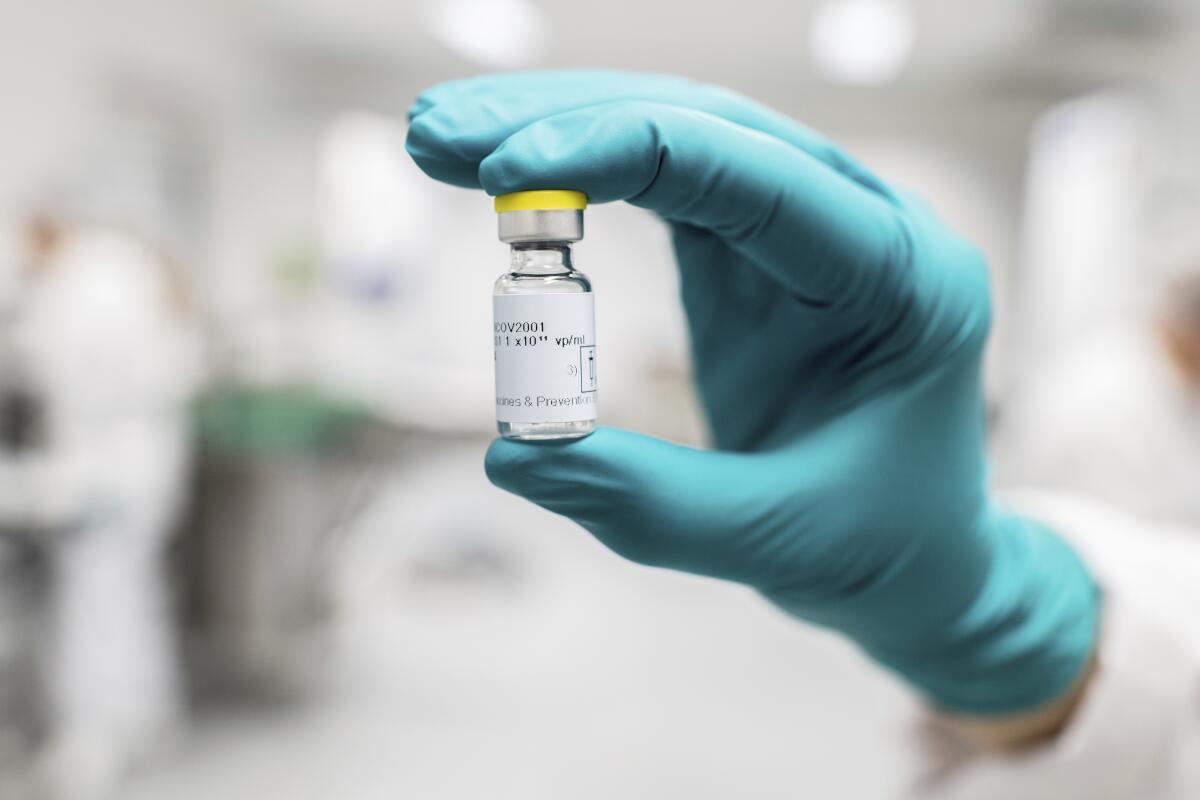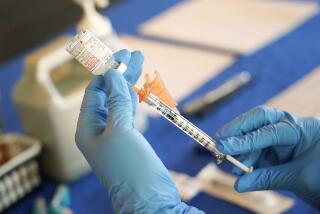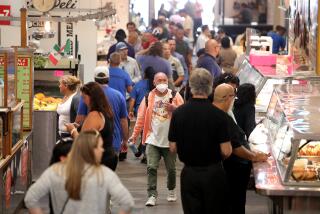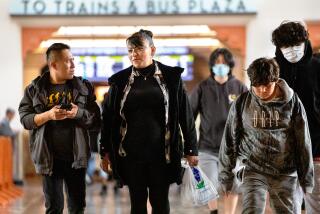A third COVID-19 vaccine could soon join the U.S. market. Will enough people want it?

- Share via
Public health officials welcomed the news that a third COVID-19 vaccine soon could be available in the United States to help speed up a lagging national vaccination campaign.
But they are also worried: Will enough people want it?
Johnson & Johnson applied Thursday for federal emergency-use authorization for its vaccine, which was 72% effective in preventing moderate and severe disease in a U.S. clinical trial.
That result may sound impressive, but not compared to the two vaccines — made by Pfizer-BioNTech and Moderna — already deployed in the United States. They were more than 94% effective in preventing people from getting sick at all.
“Why should anyone accept a less effective vaccine when there are better vaccines?” said a typical comment on a Reddit discussion board on the issue.
But scientists said that based on the available data, it is impossible to know whether one COVID-19 vaccine is more effective than another.
A central issue is the timing of the clinical trials and the increasing prevalence of new versions of the virus — such as those first detected in Britain and South Africa — that may have some resistance to certain vaccines.
U.S. trials of the Pfizer-BioNTech and Moderna vaccines were conducted in the summer and early fall, when the coronavirus variants were almost certainly less common. Johnson & Johnson did not begin its trials until September.
“If we switched this around ... it’s possible we would have seen a flip in the efficacy,” said Dr. James Campbell, an infectious disease specialist at the University of Maryland School of Medicine. “It’s difficult to know if you’re comparing apples to oranges.”
The British and South African variants have now spread to dozens of countries. Just how common they are in the United States remains a mystery, because there has been no comprehensive effort to track the mix of strains over the course of the pandemic.
But researchers say the early trials may have set an artificially high bar for vaccine efficacy and lauded the Johnson & Johnson clinical trial results.
Federal health officials, who could grant authorization as soon as this month, pointed out that vaccines shouldn’t be evaluated based on whether they prevent a cough and a headache, but rather on whether they prevent hospitalization and death.
The single-dose Johnson & Johnson vaccine was 85% effective overall in preventing severe cases of COVID-19. There were no hospitalizations or deaths following the four-week period after the immunizations had taken full effect, even in South Africa and regions of Latin America where new variants of the virus have become common.
That result is “extraordinarily important,” Dr. Anthony Fauci, director of the National Institute of Allergy and Infectious Diseases and chief medical advisor to President Biden, told reporters.
Dr. Kathleen Neuzil, the director of the Center for Vaccine Development and Global Health at the University of Maryland School of Medicine, said people should take the first federally approved vaccine that becomes available to them and not hold out for any particular brand.
“The tragedy of the pandemic, the paralysis of society, comes from filling hospitals with severe cases,” she said. “And the vaccines’ obvious ability to prevent severe infection — that’s what we should be judging them on.”
All three vaccines — Pfizer-BioNTech, Moderna and Johnson & Johnson — were designed based on strains that were common in the early days of the pandemic.
The clinical trials focused on whether the vaccines protected participants from COVID-19 symptoms and not on how they performed against particular strains of the virus.
There are reasons to worry that the emergence of certain variants may have an impact on how well the vaccines work.
The Johnson & Johnson vaccine was 72% effective at preventing moderate and severe disease in U.S. participants, but 57% effective among those in South Africa, where nearly all cases of COVID-19 were due to the variant first detected there late last year.
A vaccine designed by the U.S. company Novavax was nearly 90% effective in Britain, but that figure was 49% in a smaller study in South Africa.
Moderna and Pfizer-BioNTech have used lab tests to investigate how their vaccines would perform against the variants. When their scientists took various strains of the virus and exposed them to blood samples from people who had been vaccinated, they found that fewer neutralizing antibodies were produced in response to the South Africa variant.
Still, the immune response was robust enough that scientists believe the vaccine would offer significant protection from COVID-19.
“If the South African strain became dominant here, I think we’d be OK against severe disease,” said Dr. Barney Graham, the deputy director of the Vaccine Research Center at the National Institute of Allergy and Infectious Diseases and one of the researchers behind the Moderna vaccine.
Even so, Moderna is investigating whether to add a booster to its two-dose regimen to trigger a stronger immune response that specifically targets the South Africa variant.
Data from Britain, which operates a consortium that has collected and analyzed over 200,000 coronavirus samples, show just how quickly the mix of viral strains can change.
The week of Nov. 16, the British variant B.1.1.7 accounted for about 10% of the samples collected in Britain, according to GISAID data reviewed by Nicholas Davies, an epidemiologist at the London School of Hygiene and Tropical Medicine. By the week of Dec. 21, that figure had climbed to about 50%. By late January, 89%.
There is no such reliable data for the United States.
“It’s apparent that we’re flying blind,” said Dr. Arturo Casadevall, an immunologist at the Johns Hopkins Bloomberg School of Public Health. “This is not rocket science. We have the capacity to do sequencing — it’s just not being done.”
The U.S. Centers for Disease Control and Prevention is trying to ramp up genetic sequencing in a coordinated effort aimed at quickly detecting the emergence of new strains.
The CDC has been gathering coronavirus samples from public health departments across the country since November and now has the capacity to sequence and analyze 750 samples a week.
The agency also plans to work with commercial diagnostic labs to sequence another 6,000 samples each week.
As of this week, the CDC has reported 541 cases of the British variant, three cases of the South African variant, and two cases of a Brazilian variant.
Campbell, of the University of Maryland, said that by the time a variant is detected, there are almost certainly additional cases elsewhere.
As part of its $1.9-trillion COVID relief package, the Biden administration has asked for more money to increase the U.S. capacity to do sequencing tests.
The U.S. vaccination campaign, which began in December, has been plagued by a shortage of vaccines, scheduling problems and bureaucratic delays.
Fewer than 7 million people — or about 2% of the population — have been fully vaccinated, with another 21 million people having received the first of two shots, according to the CDC.
Health workers are now injecting 1.3 million people a day, a pace that would meet Biden’s promise to administer 100 million shots in his first 100 days in office.
Still, at the current pace it would take until at least the fall to vaccinate 70% of the population, when the country could begin to achieve herd immunity, making it difficult for the virus to continue spreading.
Scientists say time is of the essence because allowing the virus to simmer increases the chances that new variants will arise.
A committee that advises the U.S. Food and Drug Administration has started reviewing data from Johnson & Johnson and is scheduled to meet Feb. 26 to decide whether to authorize its vaccine. The company could begin shipping to vaccination sites days later.
Another vaccine that has attracted great interest is made by AstraZeneca and is already being used in Britain. U.S. officials said they are waiting for more clinical trials data to assess its effectiveness. The government is also waiting for Novavax to complete its trials.
Times staff writer David Lauter contributed to this report from Washington.
More to Read
Sign up for Essential California
The most important California stories and recommendations in your inbox every morning.
You may occasionally receive promotional content from the Los Angeles Times.











